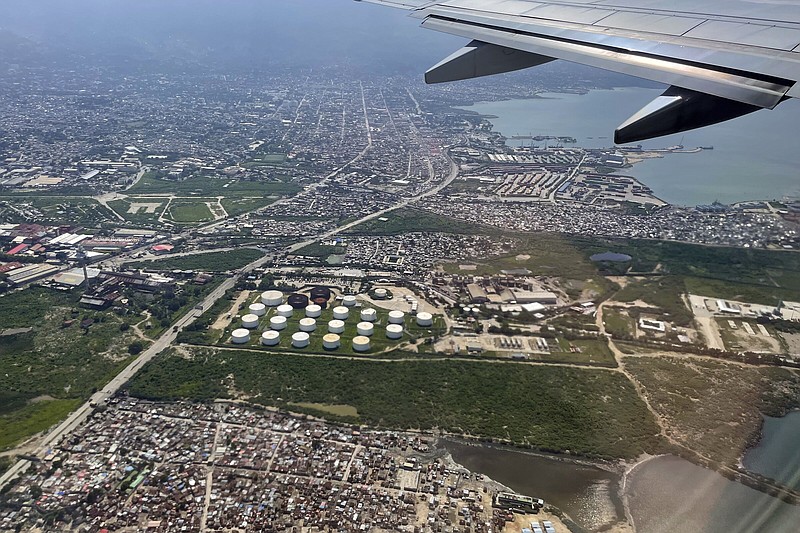Haiti police confront gang blockade
PORT-AU-PRINCE, Haiti -- Haiti's National Police was fighting to remove a gang that has surrounded a key fuel terminal in Port-au-Prince for almost two months, though it was not immediately clear Friday if the blockade was fully lifted.
In a voicemail shared Friday with The Associated Press, Police Chief Frantz Elbe congratulated officers involved in an operation to oust members of the G9 gang federation led by Jimmy Cherizier, a former police officer known as "Barbecue." The gang had refused to budge as it demanded that Prime Minister Ariel Henry resign.
It wasn't immediately clear if anyone was killed Thursday during the gunfire or whether the gang had been completely cleared from the area.
"We won a fight, but it is not over," Elbe said.
Spokespeople for police and the office of Prime Minister Ariel Henry did not return messages for comment.
Local radio stations reported that the area where the fuel terminal is located was quiet Friday.
The U.S. Treasury Department announced Friday sanctions against Haiti's Senate president and a former senator following drug trafficking allegations.
Boat passengers held in protest freed
LIMA, Peru -- An Indigenous leader in Peru's Amazon region said Friday that his community released 98 riverboat passengers -- 23 of them foreigners -- who were detained as a protest to demand government attention to complaints of oil pollution.
Wadson Trujillo said the foreign passengers include citizens of Germany, Great Britain, Spain and France, who were en route Thursday from Yurimaguas to Iquitos, when the boat was halted by Cuninico residents. But he said the people of Cuninico would continue protests -- and blocking the passage of boats -- until the government gives them concrete help.
He previously said the passengers were in good health.
"We have seen ourselves obliged to take this measure to summon the attention of a state that has not paid attention to us for eight years," he told The Associated Press.
Because of oil spills in 2014 and September 2022, he said residents "have had to drink water and eat fish contaminated with petroleum without any government being concerned," Trujillo said.
He said the spills also affected nearly 80 other communities, many of which lack running water, electricity or telephone service.
In response to Indigenous demands, Prime Minister Anibal Torres said the "evils of 200 years of republican life cannot be resolved in a day, in a few months or in a few years."
Drought tied to wildlife deaths in Kenya
NAIROBI, Kenya -- Hundreds of animals, including elephants and endangered Grevy's zebras, have died in Kenyan wildlife preserves during East Africa's worst drought in decades, according to a report released Friday.
The Kenya Wildlife Service and other bodies counted the deaths of 205 elephants, 512 wildebeests, 381 common zebras, 51 buffaloes, 49 Grevy's zebras and 12 giraffes in the past nine months, the report states.
The worst-affected ecosystems are home to some of Kenya's most-visited national parks, reserves and conservancies, including the Amboseli, Tsavo and Laikipia-Samburu areas, according to the report's authors. They called for an urgent aerial census of wildlife in Amboseli to get a broader view of the drought's impact on wild animals there.
Other experts have recommended the immediate provision of water and salt licks in impacted regions. Elephants, for example, drink 63.40 gallons of water per day, according to Jim Justus Nyamu, executive director of the Elephant Neighbors Center.
For Grevy's zebras, experts urge enhancing provisions of hay.
Van Gogh painting targeted by activists
ROME -- Environmental activists tossed pea soup on a Vincent van Gogh painting Friday in Rome to protest carbon use and natural gas extraction, but caused no damage to the glass-covered painting.
Security intervened immediately and removed the Last Generation protesters kneeling in front of "The Sower" at the Palazzo Bonaparte to deliver a manifesto.
The painting belongs to the Kroller-Muller Museum in the Netherlands and was on loan for a show in Italy's capital featuring works by Van Gogh. Officials said the 1888 painting was undamaged.
Italy's new culture minister, Gennaro Sangiuliano, condemned the protest.
"Attacking art is an ignoble act that must be firmly condemned," he said. "Culture, which is the basis of our identity, must be defended and protected, and certainly not used as a megaphone for other forms of protest."
Climate activists have staged similar protests at museums in Britain, Germany and elsewhere in Italy, targeting works by Van Gogh, Botticelli and Picasso.
The stunt backfired for some onlookers.
"It totally defeats the purpose," Hans Bergetoft, a tourist from Stockholm, said. "I am really for the cause in itself, but not the action."
